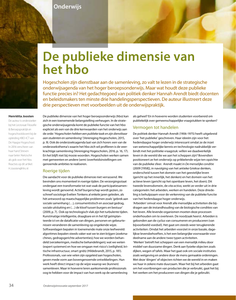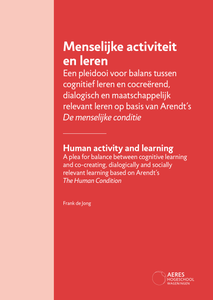Hogescholen zijn dienstbaar aan de samenleving, zo valt te lezen in de strategische onderwijsagenda van het hoger beroepsonderwijs. Maar wat houdt deze publieke functie precies in? Het gedachtegoed van politiek denker Hannah Arendt biedt docenten en beleidsmakers ten minste drie handelingsperspectieven. De auteur illustreert deze drie perspectieven met voorbeelden uit de onderwijspraktijk. http://henriettajoosten.nl/
MULTIFILE

In this article, I present a philosophical perspective on Kunneman’s concept of ‘amor complexitatis’ based on the philosophical work of Hannah Arendt. I analyse the two constituting elements, ‘amor’ and ‘complexitas’. In opposition to most classic philosophers who engage with the vita contemplativa, the eternal decontextualized aspects of life, Arendt was concerned with the vita activa, a philosophy of the world. She distinguishes three human activities: labour, which corresponds to the biological functions of the body; work which creates enduring artefacts in the world and is a predictable, instrumental activity; and action which is political in nature and is the result of humans dealing with the inherent plurality of the world. It is the realm of difference where people engage in discussion, interaction, and narratives to generate ideas, etc. The outcome of human action is unpredictable and therefore always holds the potential for something new to emerge, which Arendt calls ‘natality’, a central concept in her philosophy. Plurality is the precondition for political life. Removal or denial of difference and plurality is catastrophic for the vita activa and the realm of the political. Arendt and Kunneman are both part of a philosophical tradition which critiques modernity’s instrumentalization of human action. Both engage with the concept of love to deal with the complexities of human action without abolishing these complexities. Drawing on the work of Biesta, I then critically discuss Arendt’s perspective on education. Arendt proclaims an education for the world and it is the role of the teacher to engage the child into this world with all its complexities. The analysis of the concept of complexitas in education reveals three dimensions, each related to a particular key concept of Arendt’s philosophy: plurality, action and natality. I end this contribution with a discussion of the practical implications of Arendt’s views for teaching in the light of normative professionalism.
LINK
Hoofdstuk in bundel Aan het werk met Hannah Arendt. Het werk van de politiek denker Hannah Arendt (1906 - 1975) is populairder dan ooit. Voor professionals in onderwijs, zorg en sociaal werk is er echter nog geen toegankelijk boek over haar prikkelende en soms controversiële ideeën. Deze bundel voorziet in deze leemte. Verkrijgbaar: https://www.managementboek.nl/boek/9789492538192/aan-het-werk-met-hannah-arendt-joop-berding
DOCUMENT
Podcast In deze nieuwe aflevering ga ik in gesprek met Hanke Drop en Joop Berding over een onconventionele maar fundamentele vraag: Kan schoonheid een ideaal zijn in het onderwijs? Wat betekent het om het concept van schoonheid een serieuze plek te geven binnen het curriculum, de pedagogiek en de dagelijkse onderwijspraktijk? We onderzoeken hoe schoonheid zich verhoudt tot kunst, pedagogische idealen en de ontwikkeling van verbeeldingskracht bij kinderen. Wat gebeurt er wanneer scholen niet alleen gericht zijn op kennisoverdracht, maar ook op het stimuleren van creativiteit, makerschap en betekenisvolle ervaringen? Is het artistieke proces wellicht even belangrijk – of zelfs belangrijker – dan het eindproduct? Hanke en Joop reflecteren op het belang van ‘maken’ in relatie tot denken en leren, met inspiratie uit onder andere het werk van Hannah Arendt. We bespreken de rol van de leraar als begeleider van esthetische ervaringen, en hoe kunst ruimte kan creëren voor spel, verwondering en morele vorming binnen het onderwijs. Ook komt de spanning aan bod tussen onderwijs als vormingsproces en het toenemende economische denken, waarbij efficiëntie, meetbaarheid en resultaat centraal staan. Wat betekent dat voor ruimte voor schoonheid en creativiteit in het curriculum? Luister (of kijk) mee – en laat vooral weten wat schoonheid voor jóu in het onderwijs betekent!
LINK
Citizen participation is booming, especially the number of urban bottom-up initiatives where information and communication technologies (ICT) are deployed is increasing rapidly. This growth is good news for society as recent historical research shows that the more citizens actively and persistently interfere with public issues, the more likely a society will be resilient. And yet, at the same time, a growing number of scholars argue that due to the unprecedented impact of ICT, the public sphere is at stake. How to understand both trends? How do the anti-‘public sphere’ developments relate to the growing number of citizens’ initiatives using ICT? And if these citizen initiatives can indeed be understood as manifestations of public spheres, how can ICT foster or hinder the development of these public spheres? These questions will be explored by analyzing a Dutch citizen initiative called ‘Buuv’ (an online ‘market’ place for and by local residents) from a ‘public sphere’ perspective. The author will turn to The human condition (1958) of Hannah Arendt in order to elaborate a ‘public sphere’ perspective. An Arendtian perspective (as any perspective) highlights, however, some aspects and underexposes other aspects. Furthermore, chances are that Arendt’s thoughts are somewhat outdated, in the sense that we now live in a world where the online and the offline life intertwine — an experience that is referred to with the term ‘onlife’. Bearing these remarks in mind, the author will elaborate on the value of Arendt’s ideas to 1) the endeavor of understanding current trends in society—more urban bottom-up initiatives and anti-‘public sphere’ developments due to the broad uptake of ICT—and 2) the endeavor of revitalizing the public sphere in an onlife world. IEEE copyright
MULTIFILE

Deze afscheidsrede van Frank de Jong verwondert zich over de sterke impact van (directe) instructie in het onderwijs en de daarmee samenhangende gerichtheid op het individuele leren. Om een antwoord te vinden op die verwondering put de rede uit de filosofe Hannah Arendt en haar analyse van de menselijke conditie, de vita activa. Arendt onderscheidt drie menselijke activiteiten: arbeid, werken, spreken en handelen. Arbeid gaat over het voorzien in basisbehoeften en het creëren van een ‘thuis’ met anderen waar het goed toeven is. Werken heeft te maken met het creëren van talen en cultuur en daarmee een kunstmatige wereld. Spreken en handelen omvatten het organiseren van de samenleving en politiek bedrijven. Door het leren en onderwijs te koppelen aan de vita activa komt een beeld naar voren van een onderwijs dat zich voornamelijk richt op arbeid en werken, met een sterke nadruk op (directe) instructie en het aanleren van vaardigheden en kennis. Het spreken en handelen, het ontwikkelen van ideeën en het samenwerken aan een betere wereld, blijven vaak onderbelicht in het onderwijs. Directe instructie mag dan wel efficiënt zijn in het steeds meer geïndustrialiseerde onderwijs met eindtermen en managerial KPI’s, het is niet effectief in het licht van het de totale ontwikkeling als mens. Dit pleit voor meer ruimte te creëren voor idee-ontwikkeling, co-creatie, kennisopbouw en dialoog in het onderwijs. Een onderwijstransitie van een 'belief mode' van leren naar een 'design mode' van leren met de nodige infrastructurele verandering op verschillende niveaus die zo’n transitie vereist. Er is een groeiend bewustwording nodig dat de huidige rol en wijze van leren in het onderwijs en in (school)organisaties onvoldoende bijdraagt aan de oplossingen van de huidige complexe uitdagingen in onze samenleving. Een bredere en diepere benadering van leren in het onderwijs, waarbij niet alleen kennisoverdracht en vaardigheden worden benadrukt, maar ook het ontwikkelen van ideeën, samenwerking en dialoog centraal staan is noodzakelijk, zodat er ruimte is om spreken en handelen te ontwikkelen opdat mensen af en toe uit de rij te stappen om een beter ‘thuis’ te realiseren. Dit doe je niet in je eentje maar in cocreatie met anderen samen en dat moet je (stimu)leren.
DOCUMENT

In this article, the author will question the seemingly obvious boundary between civil disobedience, as conceptualised by Rawls and Arendt, and several examples of criminal, or simply annoying, activities which don't meet their criteria, such as the case of the ‘Top 50'. The ‘Top 50' are multi-problem Dutch-Caribbean men, who refuse to adapt to predominant norms in Dutch society. IThe author argues that political aspects of their behaviour should be acknowledged, even if they engage in criminal behaviour and don't present explicit political goals. Firstly, she questions the way in which Rawls based his definition on a centralistic conception of governmental power and contrast it with Foucault's conception of normalising power, in which power is diffuse and cannot be restricted to the enactment of formal laws. Secondly, she discusses what the minimum requirements are to be able to classifyacts as civil disobedience. Rawls and Arendt draw a clear line between criminal behaviour and civil disobedience, but their requirements may be too strict. We might miss signals of injustice if actions that do not meet these criteria are excluded from the political discourse. The conclusion is that comparing Arendt's and Rawls' conception of civil disobedience with the behaviour of a marginal migrant group may be useful in questioning the boundaries of this concept and in making it more inclusive. A wider conception of civil disobedience may help to explain the meaning of deviant behaviour in terms of social critique and to challenge the traditional understanding of civil disobedience.
DOCUMENT

Sociaal werkers ondersteunen kwetsbare burgers. Elke keer is dat zoeken wat voor deze mens in deze situatie passend is. Behalve door praktische en theoretische kennis en een methodische aanpak, laat een professional zich sturen door het perspectief en de waarden van het beroep. Voor sociaal werkers staat de waarde ‘sociale rechtvaardigheid’ centraal. In dit artikel verbind ik kwetsbaarheid als kenmerk van de doelgroep van sociaal werkers aan sociale rechtvaardigheid als richtinggevende waarde.
DOCUMENT

This volume, the result of four years of work performed by the combined research groups of Utrecht University (Faculty of Humanities) and the HU Utrecht University of Applied Sciences (Faculty of Education), focuses on the central theme of 'Normative Professionalization'. Drawing on a wide variety of scholars including Hannah Arendt, Gert Biesta, Harry Kunneman, Donald SchOn and Chris Argyris, and engaging with professionalism, ethics, virtue and morality, this book builds the argument that learning to deal with complexity supports not only education but the personal development of teachers and the improvement of society and democracy as well. This volume presents research on a broad range of topics such as worldview education, co-teaching, moral authorship, traditional-reform perspectives on education, the discourse on citizenship, teacher education, and the question how to link religion and education. The research chapters explain the theoretical lenses and methodological approaches which have been employed to get a grip on complexity.
DOCUMENT
Chatbots zijn handige tools om klantencontacten efficiënt af te handelen. De inzet van chatbottechnologie roept wel ethische vragen op. Aan de hand van een krantenartikel over het callcenter van het onlinewarenhuis Wehkamp verkent filosoof en bedrijfskundige Henriëtta Joosten een aantal morele kwesties.
MULTIFILE
